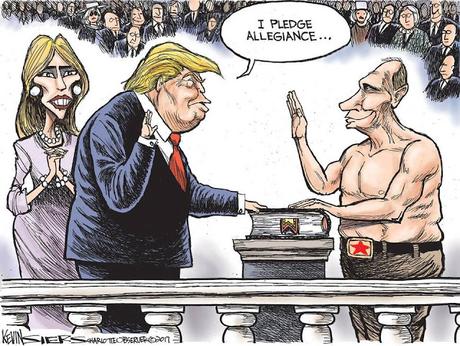 (Cartoon image is by Kevin Siers in The Charlotte Observer.)
(Cartoon image is by Kevin Siers in The Charlotte Observer.)There's been a lot of talk on cable news and social media the last few days about a New York Times revelation that soon after the 2016 the FBI began an investigation into whether Donald Trump was being controlled by Russia (and working for Russian interests).
Some people are acting like they're shocked. They shouldn't be. This is a question that that surely has crossed the mind of any thinking person in this country. Hasn't there been enough information to at least raise the question? It's not just the 101 meetings that Trump campaign members had with the Russians. We also have the question of Trump verbally attacking NATO and other allies of the U.S., his defense of Putin and denial that Russia interfered in the 2016 election, his attempt to remove sanctions against Russia immediately after assuming office (and the recent partial removal of sanctions), the secret meeting with Putin in Helsinki -- just to name a few things.
Fox News was quick to claim that no evidence was found to support the idea that Trump was acting on behalf of Russia. That's just another Fox News lie. The FBI turned their investigation over to Robert Mueller, and Mueller has not finished his investigation. We may still learn that Trump is a stooge of the Kremlin -- and that would not surprise me.
Here is just a part of the New York Times article:
In the days after President Trump fired James B. Comey as F.B.I. director, law enforcement officials became so concerned by the president’s behavior that they began investigating whether he had been working on behalf of Russia against American interests, according to former law enforcement officials and others familiar with the investigation. The inquiry carried explosive implications. Counterintelligence investigators had to consider whether the president’s own actions constituted a possible threat to national security. Agents also sought to determine whether Mr. Trump was knowingly working for Russia or had unwittingly fallen under Moscow’s influence. The investigation the F.B.I. opened into Mr. Trump also had a criminal aspect, which has long been publicly known: whether his firing of Mr. Comey constituted obstruction of justice. Agents and senior F.B.I. officials had grown suspicious of Mr. Trump’s ties to Russia during the 2016 campaign but held off on opening an investigation into him, the people said, in part because they were uncertain how to proceed with an inquiry of such sensitivity and magnitude. But the president’s activities before and after Mr. Comey’s firing in May 2017, particularly two instances in which Mr. Trump tied the Comey dismissal to the Russia investigation, helped prompt the counterintelligence aspect of the inquiry, the people said. The special counsel, Robert S. Mueller III, took over the inquiry into Mr. Trump when he was appointed, days after F.B.I. officials opened it. That inquiry is part of Mr. Mueller’s broader examination of how Russian operatives interfered in the 2016 election and whether any Trump associates conspired with them. It is unclear whether Mr. Mueller is still pursuing the counterintelligence matter, and some former law enforcement officials outside the investigation have questioned whether agents overstepped in opening it. The criminal and counterintelligence elements were coupled together into one investigation, former law enforcement officials said in interviews in recent weeks, because if Mr. Trump had ousted the head of the F.B.I. to impede or even end the Russia investigation, that was both a possible crime and a national security concern. The F.B.I.’s counterintelligence division handles national security matters.

